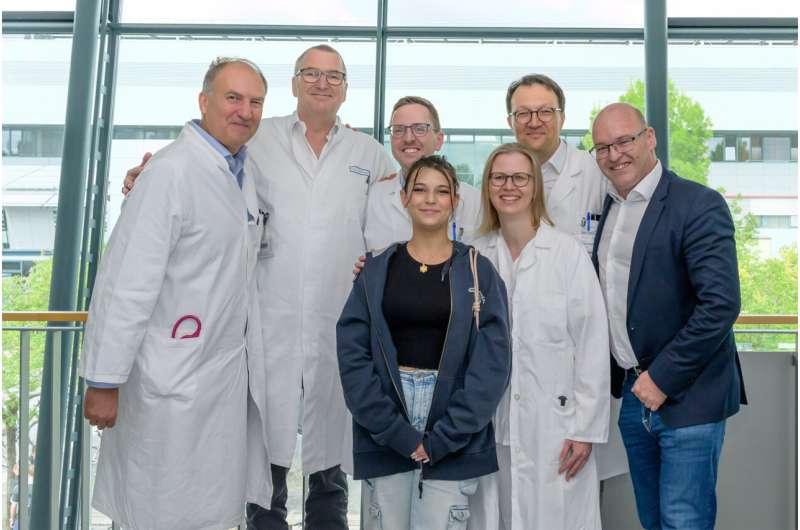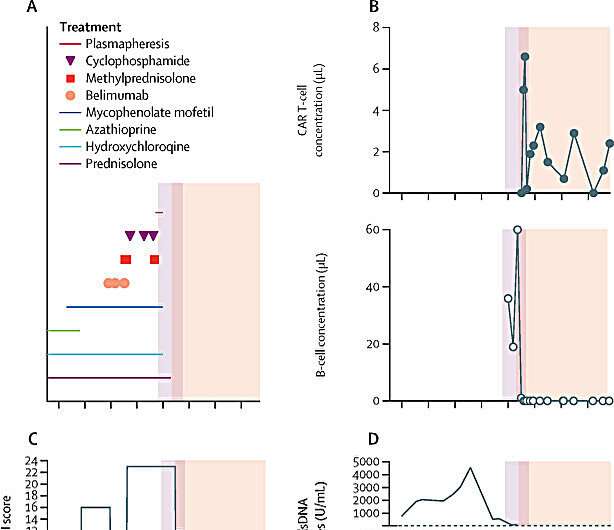This article has been reviewed according to Science X's editorial process and policies. Editors have highlighted the following attributes while ensuring the content's credibility:
fact-checked
peer-reviewed publication
trusted source
proofread
World's first CAR-T cell therapy for a child with lupus

In June 2023, Uresa A. (who was 15 years old at the time) received CAR-T cells at Universitätsklinikum Erlangen. The treatment was the last resort to slow down systemic lupus erythematosus (SLE), which is a serious autoimmune disease that was attacking Uresa's body and suddenly and seriously affected her ability to lead a normal life.
"One year after the treatment, I feel as good as I did before my diagnosis, except for a few colds," says Uresa today.
This procedure was unusual since CAR-T cells had previously only been used for leukemia or lymphoma and during studies on adults with certain advanced autoimmune diseases. These cells had previously never been used for treating children with autoimmune diseases.
The girl, who is now 16 years old, was the first child with SLE to receive the immune therapy as part of an individual treatment attempt at Deutsches Zentrum Immuntherapie (DZI) at Universitätsklinikum Erlangen. The treatment team in Erlangen has now published the results of this successful treatment in the journal The Lancet.
"Simply the fact that we have administered CAR-T cells for an autoimmune disease is something special, since it was previously only authorized for certain advanced types of cancer," explains Dr. Tobias Krickau, Uresa's pediatric rheumatologist at the Department of Pediatrics and Adolescent Medicine at Universitätsklinikum Erlangen.
"As Uresa's SLE was progressing at an increasingly fast pace despite all her medication, we were confronted with the question of whether we should give these immune cells modified in a lab to a child. This off-label treatment for an autoimmune disease in a child had never been attempted anywhere in the world, as far as we knew," says senior physician Krickau.
This treatment involves removing some immune cells (T cells) from the patient before the CAR-T cell infusion and equipping these cells with a chimeric antigen receptor (CAR) in a special cleanroom laboratory. These CAR-T cells are then given to patients and dock onto damaging autoreactive B cells in their blood and destroy them. This results in a "reboot" for the immune system.
Uresa's symptoms began in fall 2022 with migraines, exhaustion, joint and muscle pain and the red butterfly rash on the face that is typical for lupus. She had a high temperature, not enough red blood pigment and decreased levels of certain proteins that play a role in immune response and higher levels of lupus-specific autoantibodies that were attacking her healthy tissue. The SLE diagnosis was confirmed in an external clinic.
Several treatments with various medications followed. However, they attacked Uresa's liver. Despite intensive treatments, her condition deteriorated and her kidney levels also worsened. A kidney condition known as lupus nephritis occurs in over 50% of patients with SLE.
Although SLE is not as common in children as it is in adults, the disease is often more aggressive in children. Currently available treatments are more often associated with complications and serious side effects.
Dr. Krickau, who is a pediatric rheumatologist, ultimately took Uresa on as a patient at the end of 2022. "We started with the tablets and monthly intravenous therapies approved for children with the aim of suppressing her overactive immune system," he explains.
"But her kidney function rapidly deteriorated. Her kidneys were unable to transport fluids out of her body and Uresa developed severe water retention that caused her legs, hands, feet and face to swell up. She also developed high blood pressure."
From March 2023, she spent more time in hospital than at home. "In conjunction with the Pediatric Nephrology department, the next thing we tried was a highly immune-suppressive type of chemotherapy that can help with acute immunological kidney disease, but her condition did not improve," says Tobias Krickau.
In the space of a few months, doctors had to watch how the "lupus got out of control," as Dr. Krickau says. "Our patient had an enormous amount of inflammatory messenger substances in her body. We tried flushing out the damaging autoantibodies from her blood with plasmapheresis—every day for two weeks."
But Uresa's kidneys continued to deteriorate until they finally failed completely and she had to start dialysis. Uresa, who is from Upper Franconia, was in hospital on a permanent basis by this point, isolated from friends and family, which affected her badly. "I don't like hospitals, I just didn't want to be there any more," she remembers.
'I have nothing left to give her'
Dr. Krickau had come to the end of the line as far as treatment options were concerned. "I have nothing left to give her"—this is what Dr. Krickau said to the team at the Pediatric Oncology department when he approached them with the idea of trying CAR-T cell therapy.
"Up to now, this type of immune therapy has only been used in children with cancer and there is no experience with using it to treat autoimmune diseases at this young age. This is why such an initial application requires a particularly high amount of preparation and risk assessment," explains Prof. Dr. Markus Metzler, head of Pediatric Oncology at Universitätsklinikum Erlangen.
In addition, a great many organizational and legal obstacles had to be overcome. The Department of Medicine 5—Hematology and Oncology at Universitätsklinikum Erlangen has a cleanroom laboratory for producing CAR-T cells as part of clinical studies and individual treatments. After discussing the case in detail with his colleagues, Prof. Mackensen agreed to produce and use CAR-T cells in the young patient.
"The entire treatment team organized it all alongside their regular duties at the hospital in a very short amount of time," emphasizes Dr. Krickau. "We initiated the CAR-T cell therapy for Uresa as part of an extended access program for severely ill patients in accordance with the German Medicinal Products Act and the Ordinance on Medicinal Products for Compassionate Use as something known as an individual treatment attempt."
Since 2021, a team led by Prof. Dr. Georg Schett, Director of the Department of Medicine 3—Rheumatology and Immunology and Co-Speaker of the DZI, and Prof. Mackensen have successfully treated patients with various autoimmune diseases (including SLE) using CAR-T cells.
In February 2024, the team presented 15 cases as part of a pilot study in the New England Journal of Medicine; the CASTLE study with 24 participants is currently ongoing. All those who received treatment are well—they are either healthy or have significantly fewer symptoms. This is ultimately what led the team to agree to treat Uresa.
"PD Dr. Fabian Müller, senior physician at the Department of Medicine 5 and Prof. Schett explained to us how effective the treatment is in adults and how they thought it had potential for Uresa," says her mother Albana A. "But I was scared of losing her. She convinced me herself and said 'I want to do this, you have to sign the form!' The whole team worked really hard and did everything for my daughter," she remembers.

No previous treatment had been as effective
Uresa was given a mild course of chemotherapy to prepare for the treatment that made some space for the CAR-T cells in her blood at the BMT ward of the Department of Pediatrics and Adolescent Medicine.
"The trick was to strike a balance between ensuring that the chemotherapy was working properly and was not being immediately flushed out by the dialysis on one hand, and making sure that the remaining kidney function was not being put at risk on the other," explains pediatric oncologist Prof. Metzler.
The big day came on June 26, 2023: Uresa was transferred from the pediatric oncology department to the Department of Medicine 5 and received the CAR-T cells specially modified for her.
"Her kidney and lupus values improved from the third week after the treatment, " says Dr. Krickau. "We had never achieved that with any medication previously." All her symptoms gradually disappeared.
At the end of July 2023, Uresa was finally able to go home and she completed her school leaving certificate. Her aim is to complete an apprenticeship in the automotive trade, move out of home soon, and get a dog. She is very happy that she can meet up with friends again, go out and lead the life of a normal teenager.
"There are still a large number of the CAR-T cells in her blood. Because they have not only eliminated damaging B cells, but also healthy ones, they are now missing, which means Uresa's body can't defend itself properly against certain infections," explains Prof. Mackensen. Until her own B cells return, Uresa therefore receives vital antibodies intravenously every four weeks at Universitätsklinikum Erlangen.
"We were able to prevent any permanent damage to her organs because we decided to carry out the CAR-T cell therapy so early on," says Dr. Krickau.
"This success was only possible because of the way in which the physicians from several disciplines at Deutsche Zentrum Immuntherapie work closely together," emphasizes Prof. Schett.
Apart from the monthly IV of immunoglobulin, Uresa no longer needs any medication or dialysis. "She was seriously ill and her kidneys have now fully recovered, something nobody believed could happen to this extent," says Dr. Krickau.
In conjunction with the pediatric oncology department, pediatric rheumatologist Krickau is now planning a study with other children and teenagers with autoimmune diseases where he hopes to use the great potential of CAR-T cells in pediatric rheumatology.
More information: Tobias Krickau et al, CAR T-cell therapy rescues adolescent with rapidly progressive lupus nephritis from haemodialysis, The Lancet (2024). DOI: 10.1016/S0140-6736(24)00424-0




















